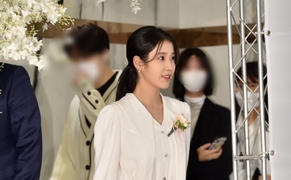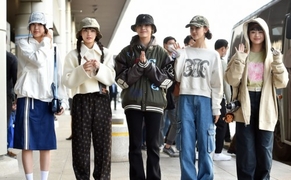 |
| A scene of the opera "Kinkakuji" by Tokyo Nikikai Opera Foundation/ Provided by ⓒChikashi Saegusa, Tokyo Nikikai Opera Foundation |
The novel Kinkakuji (金閣寺, The Temple of the Golden Pavilion) written in 1956 by Yukio Mishima is loved by many around the world as one of the best in aestheticism.
Born physically challenged, and growing up as an outcast, the protagonist is fascinated by the beauty of the golden pavilion and ends up setting it on fire. This sensational story is more impactful as it was based on an actual incident.
This famous novel was recreated as opera Kinkakuji in 1976 by Toshiro Mayuzumi, one of the leading modern composers in Japan. Notably, the opera Kinkakuji was written in German libretto. Claus H. Henneberg was picked as the librettist because the opera was first commissioned by the Deutsche Oper Berlin.
Yukio Mishima was offered to work on the opera version of his novel in the beginning. Though Mishima, who had known Toshiro Mayuzumi for a long time, is said to have told Mayuzumi, “I’m delighted my novel will be made into an opera, but I am not interested in writing in a different genre what I have already finished writing. Still, I’ll be happy to be at the premiere.” Unfortunately, Yukio Mishima was unable to attend the premiere of the opera because he took his own life in a shocking hara-kiri (suicide by disembowelment) in November 1970. The work of art riddled with issues was brought back on stage by the Tokyo Nikikai Opera Foundation on 22 February. Although it was written and composed by Japanese artists, Kinkakuji is seldom performed in Japan. After Berlin’s premiere in 1976, it was first performed in Japan in 1991 and had a keen attention at this time.
 |
| A scene of the opera "Kinkakuji" by Tokyo Nikikai Opera Foundation/ Provided by ⓒChikashi Saegusa, Tokyo Nikikai Opera Foundation |
This Kinkakuji was a co-production with Opera National du Rhin in Strasbourg, France.
The opera directed by Amon Miyamoto, opera director and also musical director active in the world’s music scene, was first revealed to the French audience and won good reviews in Strasbourg, France last March 2018.
Unlike the original story that goes in chronological order, the opera starts with a grown-up Mizoguchi looking back into the past. Mizoguchi is suppressed physically by his disabilities and mentally haunted since he witnesses his mother having an affair, and he grows up as an unstable, insecure creature. Through his life, there is the blistering gold pavilion towering over him. A symbol of absolute perfection and flawless beauty, the golden pavilion drives Mizoguchi to paranoia.
The troubled and distressed lonely inner self of the protagonist is layered with the profound expressions of young Mizoguchi. Mizoguchi as a boy is played by a young dancer using non-verbal expressions as he tails along the grown-up Mizoguchi throughout the show. Moving from one end to the other of the stage, the boy Mizoguchi portrays the lonely, suppressed ego spurring from his insecure childhood.
Toshiro Mayuzumi’s music fills the opera with flair and emotion. It does not allow one second of complete serenity and throws into the turmoil of Mizoguchi’s emotions. Minor seventh, augmented fourth, and other nonharmonic tones are frequent, and the trembling of the timpani sound raises the tension. Soon after Mizoguchi joins the temple as a Buddhist trainee, the chanting of the monks stands out as it fills the audience. The chanting, which highlights the Buddhist atmosphere of the scene with the golden pavilion in the background, seems to be there to conjure intensity rather than spiritual peace.
French conductor Maxime Pascal and Tokyo Philharmonic Orchestra charge with no sign of hesitation as they unfold their music filled with emotional heaps and a series of turbulence of tension and insecurity. The youthful energy of the composer, Maxime Pascal, constantly strikes the audience with powerful sounds he produces, undefeated by the visual flair of the stage as he creates provocative yet sophisticated music. Though, a little adjusted tempo would shed light to the hysteric elements hidden in the music and could made a more delicately fascinating presentation of the vulnerable character.
Baritone, Masumitsu Miyamoto who sang the role of Mizoguchi, leads the entire opera with acting great enough to compare to actors and his stable vocal. Baritone, Satoshi Takada who plays Tsurukawa, a friend who has a big influence on Mizoguchi, and Tenor, Tatsuya Higuchi who plays Kashiwagi, and other singers carry their weight to complete a well-blended collaboration of performance. The all-Japanese cast is also relatively fluent in articulating and singing in German.
 |
| A scene of the opera "Kinkakuji" by Tokyo Nikikai Opera Foundation/ Provided by ⓒChikashi Saegusa, Tokyo Nikikai Opera Foundation |
Along with the musical presence, one of the most interesting parts of the show was the stage towered by the image of the enormous golden pavilion. The digital display that filled the entire background was so clear that its powerful presence overshadowed the characters. The scene with the atomic bombing of WWII felt almost tangible, and under the proud and glittering image of the golden rectangular tower, the frail Mizoguchi seemed minuscule and incomplete.
In the novel, after he sets fire on the Kinkakuji, Mizoguchi flew to the hill behind the temple and thinks to himself that he would live, not die, showing a sign of hope for life. Mizoguchi in the opera also sets the pavilion on fire to cast away the pressure of the golden tower by destroying the flawless beauty. Then, from the top of the tower, he drops and disappears. In contrast to the Mizoguchi in the novel who failed in his attempt his death, the Mizoguchi in the opera carries through and meets his end. At that moment, the music suddenly stops. Perhaps beauty completed by death would need no lingering sound.
Sooyeon Sohn (Opera Critic and Professor at Sangmyung University /yonu44@naver.com)
Supervision : Haejin Lee
 |
#The Temple of the Golden Pavilion #opera #Kinkakuji #Tokyo Nikikai Opera Foundation
Copyright by Asiatoday
Most Read
-
1
-
2
-
3
-
4
-
5
-
6
-
7





















